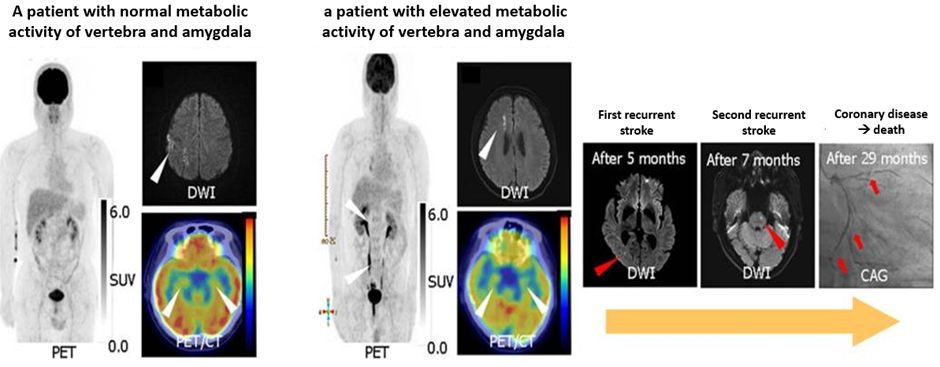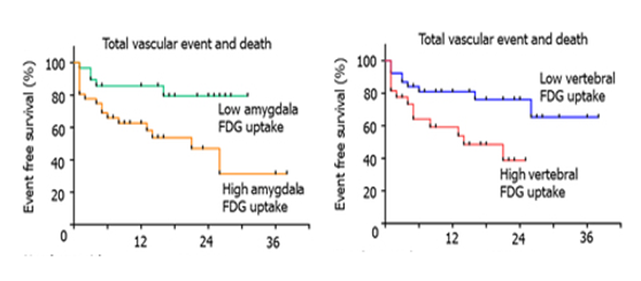SNUH confirms new indicators predicting stroke prognosis
- Acute stroke patients with an activated amygdala and lumbar vertebrae metabolic activity have a high possibility of worsening prognosis
- Identification of new pathophysiological mechanisms involved in stroke prognosis in addition to traditional risk factors

[Figure] Representative 18F-fluorodeoxyglucose positron emission tomography (FDG PET) images of patients with and without recurrent stroke. A patient with elevated metabolic activity in the amygdala and vertebra (right) suffered two recurrent strokes after hospital discharge and eventually died of coronary artery disease. On the other hand, the patient with normal metabolic activity (left) showed a stable prognosis without recurrence of stroke.
New possibility for predicting the prognosis of stroke patients was presented. A study has found that when the metabolic activity of the amygdala in the brain, which is activated when you feel fear, anxiety, or stress, is active, the risk of vascular disease in stroke patients increases.
On January 9, a joint research team led by Professor Kim Jeong-Min of Seoul National University Hospital and Professors Park Kwang-Yeol and Prof Seok Ju Won of Chung-Ang University Hospital presented their research which is based on data from the positron emission tomography (FDG-PET) scans of 110 stroke patients to determine whether metabolic activity in the amygdala and vertebra affects stroke prognosis.
To improve the prognosis of stroke, which has a high risk of death, it is important to control vascular risk factors (hypertension, diabetes, dyslipidemia, etc.). However, there are stroke patients who experience recurrence or vascular disease even when vascular risk factors are well managed, and the cause of this is not well known.
In addition to traditional risk factors, the research team paid attention to the amygdala in the brain as a factor involved in the poor prognosis of stroke patients. It has been recently reported that the amygdala, which is activated when you feel fear, anxiety, or stress, increases the possibility of vascular disease by increasing inflammatory cells in hematopoietic organs such as the spine when metabolism is active.
However, the effect of the amygdala on the prognosis of stroke patients has not yet been studied. To test this, the research team investigated 110 patients who were hospitalized for acute stroke from August 2015 to February 2020 using the positron emission tomography (FDG-PET) method, which measures the metabolic activity of organs.
Afterwards, the patients who were discharged from the hospital were followed up to investigate the recurrence of stroke and vascular events (myocardial infarction, peripheral arterial disease, death). As a result, it was confirmed that patients with high metabolic activity in the amygdala and the lumbar vertebrae had a poorer prognosis than those with low levels.

Figure 3. Survival curve analysis according to the 18F-fluorodeoxyglucose (FDG) uptake in the lumbar vertebrae and the amygdala. (Left) Patients with elevated FDG uptake in the vertebral body had a lower overall vascular event-free survival. (Right) Patients with an increased FDG uptake in the amygdala had a lower stroke recurrence-free survival.
In particular, patients with high amygdala metabolic activity had a 3.1-fold increased risk of vascular events compared to patients with low metabolic activity, and those with high metabolic activity in the spine were found to have a 4.9-fold increased risk of stroke recurrence.
In addition, as a result of adjusting for various variables such as diabetes and glomerular filtration rate, it was confirmed that the metabolic activity of the amygdala and spine had independent predictive power for stroke recurrence and vascular events.
The research team emphasized that this study is significant because it confirmed that not only traditional vascular risk factors but also the neural pathway connecting the brain and heart can affect cardiovascular disease.
Furthermore, the research team predicted that the association between amygdala metabolic activity and vascular disease could be used for stroke treatment strategies in the future, as it suggests the possibility that treatment for anxiety and stress is effective in preventing stroke recurrence.
Prof Kim Jeong-Min of SNUH said, “Through this study, we were able to discover a new pathophysiological mechanism that affects the prognosis of stroke.” He also added, “Follow-up studies will be conducted to more accurately identify the mechanism and develop appropriate treatment strategies.”
The results of this study, which was conducted with the support of the National Research Foundation of Korea, were published in the January issue of the Journal of the American Heart Association, ‘Circulation Cardiovascular Imaging’.

[Pictures from left] SNUH Prof Kim Jeong-Min and Chung-Ang University Hospital Prof Park Kwang-Yeol and Prof Seok Ju Won